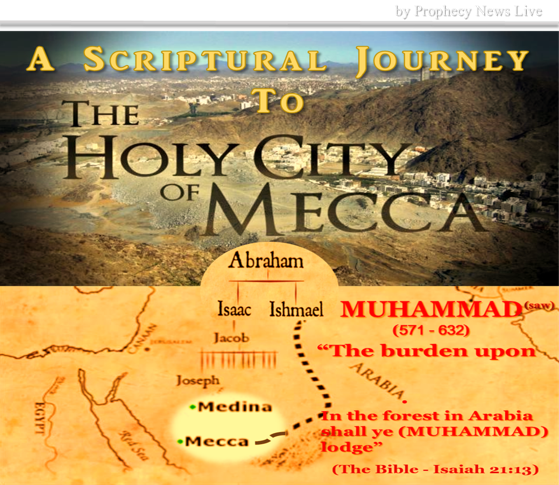Now concerning this, the following Biblical verses says that God spoken to Hagar at the time when she and her baby Ishmael were alone in this wilderness now called Mecca. At which time, God heard their cry; an Angel of God called to Hagar out of heaven and said unto her:
“What grieves thee Hagar? Fear not: for God hath heard the voice of the lad where he is. Arise, lift up the lad, and hold him in your hand; for I will make him a great nation. And God opened her eyes, and she saw a well of water; and she went, and filled the bottle with water, and gave the lad drink. And God was with the lad; and he grew, and dwelt in the wilderness, and became an archer. And he dwelt in the wilderness of Paran” (Genesis 21: 17-21).This verse of Genesis tells of the time and place in Hagar’s life when she was alone in the wilderness with her infant child named Ishmael (peace be upon them). To start, the wilderness of Paran here mentioned is located in Arabia. In the time of the Prophet Abraham, Hagar and Ishmael (peace be upon them) were left there to settled, at which time, the land was unpopulated barren desert valley having no signs of life food or water; for this the Bible refers to this place as wilderness of Paran. The Bible say Paran, but in Arabic the word is Fa’ran — as Hagar and Ishmael (peace be upon them) were isolated in that part of the desert, passing by Arab-Egyptian traders regarded them as Fa’ran meaning two refugees. Because of the miraculous well mentioned in Genesis 21:19, and since water is the most crucial element in desert life, Arab travelers on the trade route began colonizing near the well with Hagar and her baby Ishmael (peace be upon them). This eventually grew into a permanent Arab settlement from which Ishmael and his progenies became known as Arabs.
Linguistically, the word Arab means desert and wasted barren land well-nigh waterless and treeless. From the dawn of history, the Arabian Peninsula and its people have been called as such. But even before Ishmael (peace be upon him) was born, according to the Bible (Gen. 16:12), God made mention to Hagar that her son would grow up to be a wild man—an Arab in other words.
Ishmael learned Arabic at the hand of the tribe of Jurhum, one of the tribes to settle near the well. One of the prominent Arab tribes that emerged from this event was the Quraysh who trace their ancestry through Ishmael’s second son named Kedar. Into this tribe that the Prophet and Messenger of God named Muhammad (peace be upon him) was born approximately six hundred years after the advent of Jesus (peace be upon him).
Mecca thus became the center of the Islamic religion in the 7th century. Medina is another Holy Islamic City in Arabia. It is where the Prophet Muhammad (peace be upon him) and the early Muslims once took flight for safety; from which time the Islamic calendar begins. It is in Medina that Islam gained strength, and there the Prophet Muhammad (peace be upon him) himself established the first Islamic State.
Indeed, the phenomenal event of Hagar and Ishmael in the wilderness is commemorated by Muslims each year during Hajj (pilgrimage). It is a blessed event and fifth pillar of Islam. Every year for the past 1,400 years, millions of Muslims from all parts of the world have been making pilgrimage to the sacred City Mecca in commemoration to the event of Abraham, Hagar and Ishmael (peace be upon them). For instance, the running between two small hillocks (Safa and Marwah) during pilgrimage is done in memory of Hagar’s search for water in her hour of desperate need—where Ishmael (peace be upon him) is described in the Bible as having become extremely restive from the agony of thirst. There, it is said, sprouted a fountain which still exists today in some form, and water from that spot is considered to be blessed water. Tens of millions of Muslims every year drink from it during the Hajj or pilgrimage as seen in the following Hajj video documentary.
_________________________________________________________________________________
Please note the meaning of the following abbreviations:
The name of the Holy Prophet of Islam, Muhammad, has been followed by (saw) which is an Arabic abbreviation for the salutation Sallallahu Alaihi Wasallam (may the peace and blessings of Allah Almighty be upon him). The name of other Prophets are followed by (as), an Arabic abbreviation for Alasihissalam (on whom be peace). The actual salutations have not generally been set out in full, but they should nevertheless, be understood as being repeated in full in each case. The symbol (ra) is used with the name of the Disciples of the Holy Prophet (saw). It stands for Radi Allahu ‘anhu/‘anha/ ‘anhum (May Allah be pleased with him/with her/with them.
_________________________________________________________________________________
Prophecy News Live related articles for reading:
Islam… Fulfillment Of Biblical Prophecies
Muhammad a Descendant from Hagar...
Muhammad The Unlettered Prophet...
The Prophet After Jesus / a prophecy fulfilled...
Thy Kingdom Came As Promised...












No comments:
Post a Comment